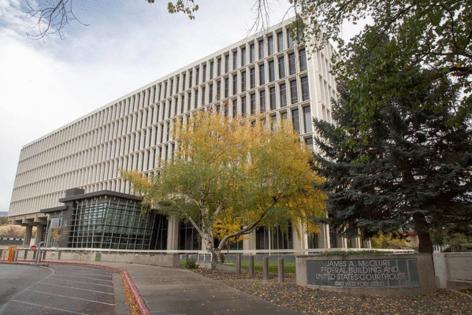Idaho lawmakers want to police immigration locally. Here's what a judge said
Published in News & Features
BOISE, Idaho — A judge this week blocked part of an Idaho law creating new state-level immigration crimes.
Gov. Brad Little signed House Bill 83 in March, after the Republican-dominated Legislature passed the measure to allow local law enforcement to wade into an area reserved for the federal government. Police could have enforced the law if they first detained or investigated an undocumented immigrant for a separate possible crime.
However, the American Civil Liberties Union immediately sued, and U.S. District Court Judge Amanda Brailsford issued a temporary restraining order hours after the bill was signed into law.
On Tuesday, Brailsford granted a temporary restraining order, provisional class certification and a preliminary injunction. The court blocked enforcement of the state-level immigration crimes of “illegal entry” and “illegal reentry” until the litigation is resolved. Other parts of the law, such as requiring law enforcement to cooperate with federal immigration authorities as much as possible, may go into effect.
“We applaud the court for protecting our immigrant community and the Constitution,” Paul Carlos Southwick, ACLU of Idaho Legal Director, said in a news release. “We want to be clear — it is well established that Idaho has no place enforcing immigration law. The Idaho Legislature’s attempt to sidestep the Constitution will not be tolerated. We are proud to fiercely defend the constitutional rights of everyone, even if they were born outside our borders.”
The plaintiffs were two entities that work with immigrants — The Idaho Organization of Resource Councils and The Alliance of Idaho — as well as five immigrants. The defendants were Attorney General Raul Labrador and multiple county prosecutors. Labrador’s office declined to comment on the new ruling and referred the Idaho Statesman to the Idaho Department of Correction.
One of the arguments in the case was whether federal law is supreme in immigration enforcement in all cases.
The U.S. Supreme Court decided that the powers of immigration enforcement belonged to the federal government in 1875, when justices ruled that a California law to allow a state official to inspect immigrants arriving by sea was unconstitutional, according to the Federal Judicial Center.
There are two types of “preemption,” wherein one authority supersedes another, according to Geoffrey Heeren, a University of Idaho professor of law. The first is conflict preemption, which occurs when a state law directly conflicts with federal law. The second is “field” preemption: Congress has created a comprehensive set of regulations that covers everything, essentially not leaving any room for other rules.
Idaho’s attorneys argued that the state law was complementary to federal law and there was no field preemption.
The state also contended that none of the plaintiffs had standing to challenge the law. The state’s attorneys said that any injury or harm was speculative and that the immigrants already were subject to federal immigration enforcement, according to Heeren.
On the other hand, the ACLU’s lawyers said the plaintiffs had standing because the statute would open someone up to enforcement if they were stopped simply for an investigation, Heeren said.
In her ruling, Brailsford wrote that the five immigrants and the Idaho Association of Resource Councils have standing at this point. Although it was unclear whether the Alliance of Idaho had standing, Brailsford wrote that she didn’t need to make that determination now, because the other groups have the ability to challenge the law.
Another issue was the state’s definition of illegal entry.
A person would commit “illegal entry” under the law if they entered or tried to enter Idaho “at any location other than a lawful port of entry or through another manner of lawful entry,” according to the bill text.
The ACLU’s lawyers argued that the provision was unconstitutionally vague, because there is no way to lawfully or unlawfully enter Idaho from another state, according to court documents.
Idaho said in filings that if someone entered the country legally, then they could enter the state legally.
House Bill 83 passed on party lines, part of a series of moves Republican legislators took to make Idaho “undesirable” for immigrants, according to previous Statesman reporting.
Majority Caucus Chair Jaron Crane, a Nampa Republican, said in early April that the immediate lawsuit was a sign lawmakers were “right over the target.”
“It’s a good bill, it’s constitutional,” Crane claimed. “I think (the ACLU lawsuit) is a very good sign we’re doing the right thing.”
_____
©2025 Idaho Statesman. Visit at idahostatesman.com. Distributed by Tribune Content Agency, LLC.







Comments